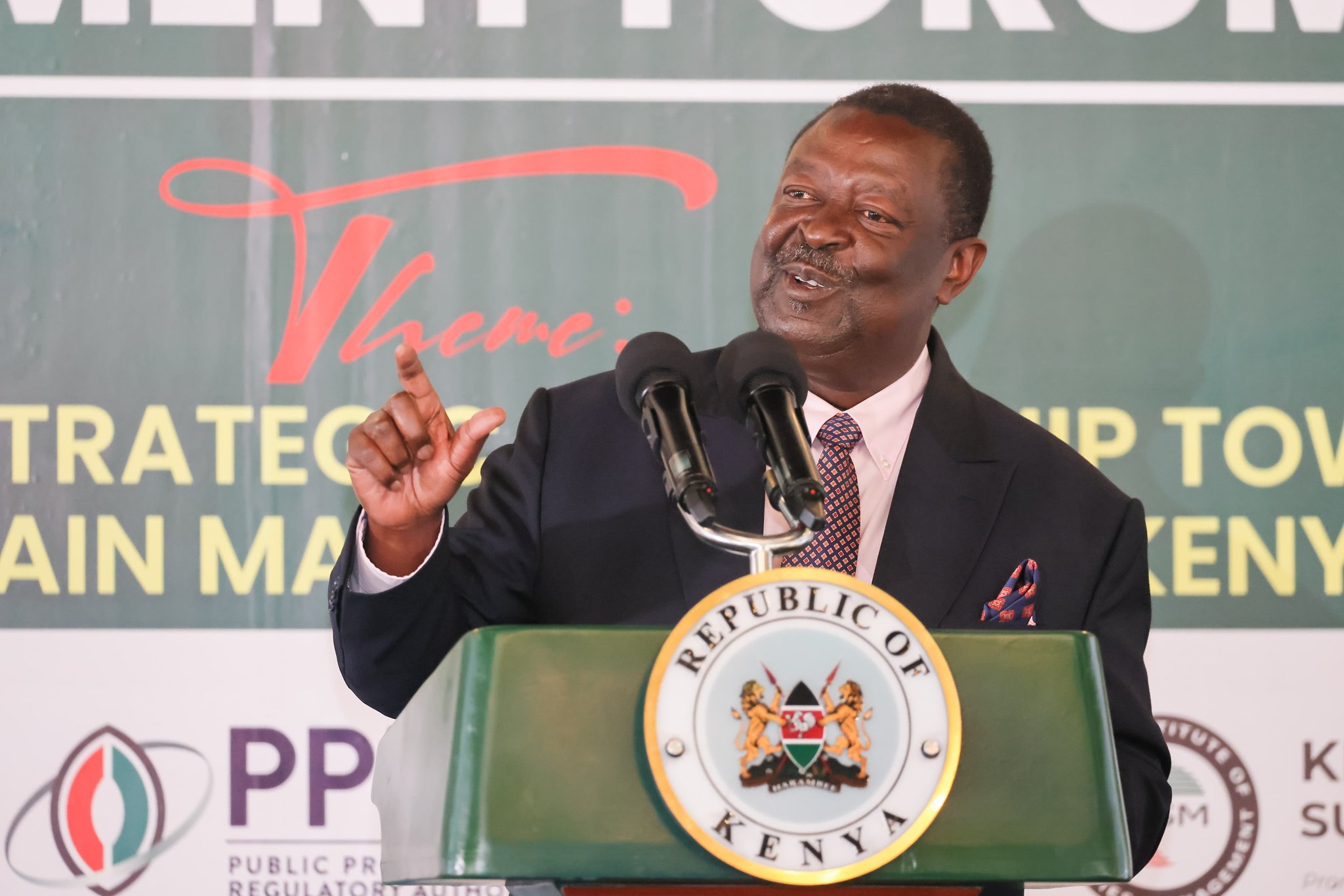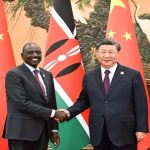Prime Cabinet Secretary Musalia Mudavadi has called for crucial amendments in the supply chain and procurement laws to help streamline the sector and maximise on results.
Mudavadi has told professionals to adopt a sector-based approach in reviewing the laws and regulations governing the sector for them to drive an agenda that fits their profession.
“Don’t wait for a top-down approach but ensure all amendments you are crafting are specific and aligned to the dynamic changes caused by the navigating economic turbulences being witnessed among other issues.” said Mudavadi.
“Strategic leadership for stabilizing supply chains call for procurement processes that deliver value for money at all levels. You need to work around identifying who are the beneficiaries of this processes keeping in mind the national interest at stake.” he cautioned.
Mudavadi noted that pressure from high debt service has forced the Government to make tight budget adjustments on essential public sector development programs.
Owing to the severity of the situation, Mudavadi said Government has been forced to make difficult decisions to keep the country going, thus slowing down the transformation agenda.
Similarly, he said they have been working to avoid public confrontation with the people, particularly the youth, who have expressed their displeasure on the cost of living and lack of jobs through public demonstrations.
“This has slowed down the implementation of the Government’s Bottom-Up Economic Transformation Agenda, thus stifling our ambitious vision of economic and social transformation,” Mudavadi said.
Against the backdrop of the crisis, the PCS said the Government has taken serious austerity measures, to improve efficiency on allocation of resources and cut back on wasteful expenditure.
Mudavadi, who was speaking during the Heads of Supply Chain and Procurement Forum 2024 in Mombasa, urged the procurement professionals to play their role in managing resources.
He said procurement and supply chain management is central for growth and transformation of the country to a middle-income industrialized nation.
“You can help to improve the situation and safeguard the livelihoods of our people, particularly if you embrace the technological advances driving your industry, including artificial intelligence, blockchain and cloud computing,” Mudavadi told the forum.
He said procurement professionals can help improve the situation and safeguard the livelihoods of Kenyans, particularly if they embrace the technological advances driving their industry, including artificial intelligence, blockchain and cloud computing.
“You should be helping to ease the pain of the Government by ensuring that all procurement processes deliver value for money for the people. Unfortunately, you stand in an awkward position where the supply chain and procurement community is blamed for the most rampant cases of public sector fraud and corruption that have constricted the growth of our country,” he said.
He cited some of the grand corruption cases in the country like Goldenberg, Anglo Leasing and reports in 2021 that Kenya loses Sh2 billion daily on corruption, mostly related to procurement rigging, saying the country should never experience such instances again.
He regretted that the Controller of Budget and Auditor General publishes a litany of corruption, abuse of office and mismanagement of public resources every year.
Globally, at least $2.6 trillion is lost annually to corruption, which means corruption eats away 5 percent of the world’s Gross Domestic Product.
According to Ethics and Anti-Corruption Commission (EACC), the estimate for Kenya is Sh608 billion or 7.8 percent of GDP.
Kenya was ranked 126 out of 180 countries in the 2023 Transparency International Global Corruption Index
He said corruption hurts the poor people most because they are denied health services, education, water, electricity, roads and other services that should transform their livelihoods.
Public procurement, he noted, is perceived to be more susceptible to corruption, compared to other areas of government, such as tax collection, passport issuance, the judiciary or public utilities.
“My challenge to you today is to reflect on how you can position your profession to support our country’s development agenda. You have an opportunity to change the negative perception and blanket condemnation about your noble profession by ensuring that your members operate within the laid down legal and regulatory frameworks,” he said.
But also, Mudavadi said the profession can play a more strategic role in helping Kenya navigate the complex issues that it is experiencing, which could be facilitated by addressing systemic weaknesses and loopholes in the supply chain and procurement system.
He urged them to rise above the “10 percent cut” label that is synonymous with procurement practice.
“Weed out bureaucrats, suppliers and procurement officers engaging in corrupt practices such as bribery, embezzlement, kickbacks and tender rigging that undermine transparency and fairness in public service delivery,” he directed.
He also urged them to enhance transparency in procurement process by addressing issues like non-disclosure of information and processes that can breed mistrust and suspicion among stakeholders.
They were also required to address the root causes of inefficiencies and delays caused by Government red tape and bureaucracy, which are frustrating for both suppliers, government agencies and Kenyan who need efficient service delivery.
“The time is now, not tomorrow, to fix these issues. Governance is a key pillar of the Government’s economic and social transformation agenda. Enhancing accountability and integrity of our procurement and supply chain systems will support Government’s efforts to protect Kenya’s reputation as a regional financial and logistics hub in Eastern Africa,” he noted.
He directed them to play their part in safeguarding Kenya as an attractive destination for Foreign Direct Investment.
He assured that his office will continue to work with the other Ministries, Departments and Agencies to ensure they are well appraised to deliver services to Kenyans through the laid-out performance contracts, medium term plans and strategic plans.





